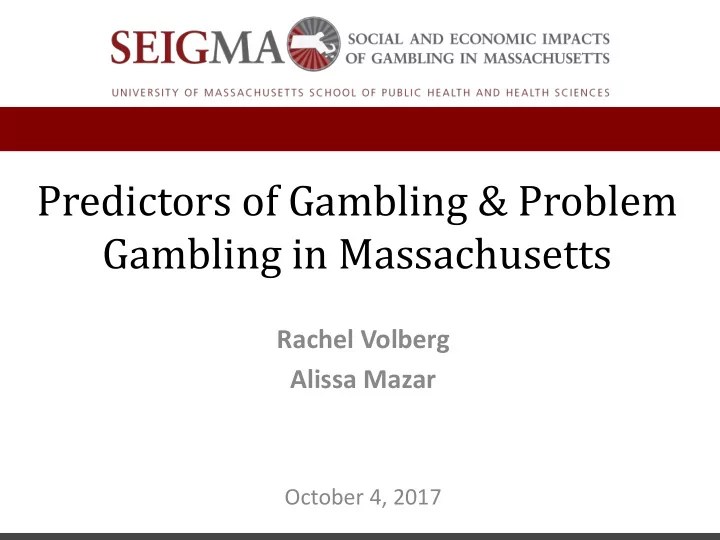

Predictors of Gambling & Problem Gambling in Massachusetts Rachel Volberg Alissa Mazar October 4, 2017
Overview • Baseline General Population Survey (BGPS) completed in 2013/2014 – Descriptive report published in 2015, updated 2017 • Team completed 4 deeper analyses of BGPS data • Purpose is to identify predictors of gambling & problem gambling in MA • Utility – Inform development of PG prevention, intervention, treatment initiatives – Inform cohort (MAGIC) study
Baseline General Population Survey • Sample drawn from a list of addresses • Respondents could complete online, on paper, or by telephone • Data collected from Sept. 2013 – May 2014 • N=9,578 respondents – Respondents classified by Gambling Participation and PPGM
Gambling Groups in MA 129 600 2,523 6,271 Non-Gamblers Recreational Gamblers At-Risk Gamblers Problem/Path Gamblers
1 st Analysis 70% 60% 50% 40% 30% 20% Respondents 10% 0% Gambling Participation
2 nd Analysis 70% 60% 50% 40% 30% 20% Respondents 10% 0% Gambling Participation
3 rd Analysis 70% 60% 50% 40% 30% 20% Respondents 10% 0% Gambling Participation
4 th Analysis 70% 60% 50% 40% 30% 20% Respondents 10% 0% Gambling Participation
Characteristics Included in Multivariate Models • Demographic Factors – Gender, Age , Race/ethnicity, Country of birth, Marital status, Education, Employment, HH income, Military service, MA region of residence • Health-related Factors – General health, Stress, Mental health, Tobacco, Alcohol, Binge Drinking, Illicit drug use, Problems with drugs/alcohol, Behavioral addictions, Childhood happiness, Extreme sports • Gambling-related Factors – Involvement of friends/family in gambling – Past-year participation in 10 gambling formats
Characteristics Distinguishing Non-Gamblers from Recreational Gamblers Characteristic Largest Difference Have a lower portion of friends and family that are regular gamblers Not use alcohol Higher educational attainment Be a student, homemaker, disabled, or retired Be either 18-34 or 65+ Be born outside the United States Not binge drink Have lower household income Not use tobacco Have less happy childhood Not have served in the military Be non-White Smallest Difference Not have problems with drugs or alcohol
Characteristics Contributing to Higher Gambling Involvement Characteristic Largest Difference Have a greater portion of friends and family that are regular gamblers Have lower educational attainment Be male Binge drink Have poorer health status Smallest Difference Use tobacco
Characteristics Distinguishing At-Risk Gamblers from Recreational Gamblers Characteristic Be a casino gambler Largest Difference Have a greater portion of friends and family that are regular gamblers Play instant lottery games Play daily lottery games Be male Be an online gambler Be born outside the United States Participate in private betting Have lower educational attainment Play bingo Not purchase raffle tickets Have lower HH income Have mental health problems Smallest Difference Have no alcohol use in past 30 days
Distinguishing At-Risk from Recreational Gamblers Controlled for Number of Gambling Formats Characteristic Largest Difference Number of gambling formats engaged in Have a greater portion of friends and family that are regular gamblers Not purchase raffle tickets Be born outside the United States Be a casino gambler Have lower educational attainment Be male Have lower HH income Have mental health problems Smallest Difference Have no alcohol use in past 30 days
Characteristics Distinguishing Problem/Pathological Gamblers from Recreational Gamblers Characteristic Largest Difference Play daily lottery games Have a greater portion of friends and family that are regular gamblers Be Black Be a casino gambler Be male Be an online gambler Play instant lottery games Have behavioral addictions (overeating, sex, pornography, shopping, exercise) Have lower educational attainment Be born outside the United States Smallest Difference Have less happy childhood
Distinguishing Problem/Path from Recreational Gamblers Controlled for Number of Gambling Formats Characteristic Largest Difference Number of gambling formats engaged in Be Black Have a greater portion of friends and family that are regular gamblers Not purchase raffle tickets Be born outside the United States Have lower educational attainment Have behavioral addictions (overeating, sex, pornography, shopping, exercise) Have less happy childhood Have poorer health status Smallest Difference Participate in private betting
Summary of Multivariate Predictors Higher Gambling Problem and Non-Gambler At-Risk Gambler Involvement Pathological Gambler Gender Male Male Male Age 18-34 or 65+ Race/Ethnicity Non-White Black Born in United States No No No Marital Status Educational Attainment Higher Lower Lower Lower Student, Homemaker, Employment Disabled, or Retired Household Income Lower Lower Military Service No Region of Massachusetts
Summary of Multivariate Predictors Higher Gambling Problem and Non-Gambler At-Risk Gambler Involvement Pathological Gambler Health Status Poorer Extreme Sports Stress Level Tobacco Use No Yes Alcohol Use No No Binge Drinking No Yes Illicit Drug Use Drug or Alcohol Problems No Behavioral Addictions Yes Mental Health Problems Yes Childhood Unhappiness Higher Higher
Summary of Multivariate Predictors Higher Gambling Problem and Non-Gambler At-Risk Gambler Involvement Pathological Gambler Friend & Family Gambling Fewer More More More -- -- Traditional Lottery -- -- Daily Lottery Games Yes Yes -- -- Instant Lottery Games Yes Yes -- -- Raffles No -- -- Casino Gambling Yes Yes -- -- Bingo Yes -- -- Horse Racing -- -- Sports Betting -- -- Private Gambling Yes -- -- Online Gambling Yes Yes Shaded cells indicate the strongest individual predictor in each analysis.
Implications for Prevention • Importance of targeting excessive gambling levels rather than gambling in general • The social network of gamblers is a particularly important target for prevention • Certain demographic groups merit special attention • Certain forms of gambling also merit attention as they pose an elevated risk to MA residents
For more information Williams, RJ, Zorn, M, Volberg, RA, Stanek, EJ, Freeman, J, Maziya, N, Naveed, M, Zhang, Y, & Pekow, PS. (2017). Gambling and Problem Gambling in Massachusetts: In-Depth Analysis of Predictors . Amherst, MA: School of Public Health & Health Sciences, University of Massachusetts Amherst A PDF of this report can be downloaded at www.umass.edu/seigma
Recommend
More recommend